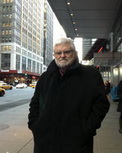 Chris
McDonnell, UK
Chris
McDonnell, UKchristymac733@gmail.com
 Chris
McDonnell, UK
Chris
McDonnell, UK
christymac733@gmail.com
Previous articles by Chris Comments
welcome here
July 11, 2018
Baggage
on the journey

Sometimes,
when we are clearing out the loft, we come across a dusty cardboard box
full, apparently, of junk. Out of curiosity, we go through the
long-forgotten items and suddenly, near the end of our search, we find a
long lost treasure. This is treasure, not in the financial sense, but
something that meant a lot to our personal story, something that we
mislaid on the way and had in fact forgotten about.
As
we sift through the collection of faith experiences of a life time, we can
get the same sense of surprise and wonderment. Different experiences are
treasures at different times. They help us on our way, we grow because of
them, we value the opportunity they gave to each of us. And we move on.
It
is not a matter of rejection but a question of growth. Too often we hang
on to a particular experience rather as a child does to a comfort blanket.
It does, of course, take courage to let go, and sometimes we are fearful
of the risk. We are experiencing something of that in the Church in our
times, for there are those whose personal fragility prevents movement as
they look back over their shoulder to a supposed golden age of belief and
practice that is no longer there. It would be impossible for us to
practice our faith in the Risen Lord as earlier Christians did. We are a
different people in a changed world. But that doesn’t fracture our
faith, it asks us to look at it through contemporary eyes.
Walbert
Buhlmann, in his book "The
Coming of the
“Renewal
is a continuous process, just as life renews itself all the time, or else
arteriosclerosis sets in as a sign of the approaching end. The Council was
not a finish, but a fresh start, a thrust forward, after which the post-conciliar
Church must go bravely on her way”
This
is a seminal book, whose comments after nearly forty years are more than
relevant to our lives today. Mgr. Kevin Kelly
expressed a similar view when he said in his book “50
years receiving Vatican II” , published in 2012, that ”The
Council is a process, not an event”
The
art of making a success of a long journey is to take with you what you
need, use what is necessary at a particular time, leave it behind and
carry on. The challenge comes in making the selection, of recognising what
we should keep in order that we might be sustained and then setting out
afresh each morning with a lightened load. Relieved of the clutter,
re-focused by the found fragments of lost treasure, the story continues.
Somewhere
in the writings of Thomas Merton, he describes the monk as being a person
on the margin, an interesting place to be when writing or commenting on
the nature of our changing society.
Christians
are so often caught between a rock and a hard place, living our lives in society,
yet having to be careful that we don’t just accept societal values
without careful thought and good judgement.
Fragmentation
in the West proceeds at a pace. We see it in the breakup up of political
parties where smaller groups are emerging representing a narrow platform
of opinion. We see it in a society where often those who are already poor,
get poorer and those who have wealth increase their considerable fortunes.
We see it when smaller parts of a Nation seek independence, pursuing an
ethnic or language based identity.
And
where is the Christian Church in this, often chaotic, diversity? In
seeking to be a pilgrim Church, offering Gospel values for our lives, it
is no good turning our backs and caring only for ourselves.
The
issues that face other communities, in whatever country or continent, are
ours too. Our voice is significant, our voice needs to be heard. Yet you
cannot be understood if the language you use is archaic and has therefore
no meaning for those we address. And your life-style has to match the
message you give. We will not be listened to if we duck the crucial issues
of our times, if such matters go un-addressed by the Christian people.
That
may well involve asking ourselves some difficult questions first, before
we attempt an exchange of views with others, being honest about where we
are and the historic journey that has brought us to this point. That path
has not been without our making mistakes among many successes; it is
peopled by both saints and sinners.
Merton’s
comment applies in some respect to every Christian. We are on the edge
looking in, our value system is Gospel-inspired and the practice of our
faith should show it.
END
====